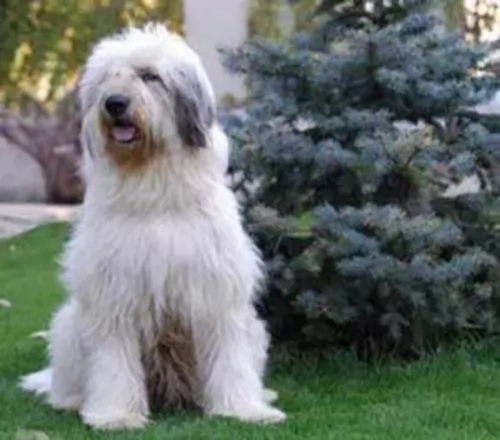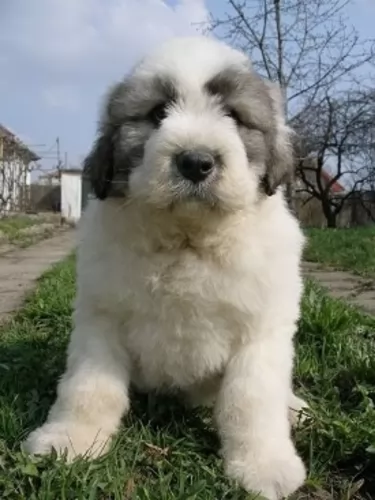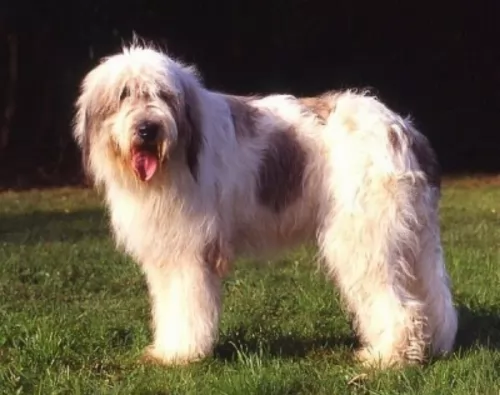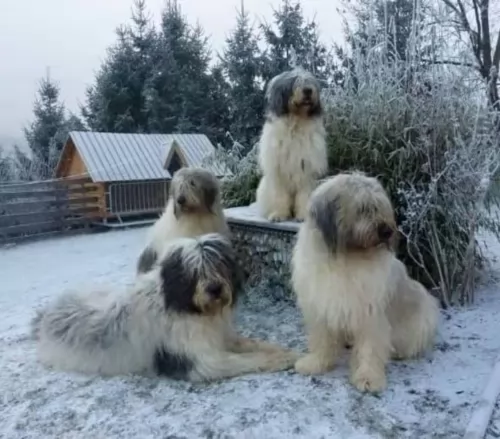 Petzlover
PetzloverMioritic Sheepdog is originated from Romania but Mixed is originated from United States. Mioritic Sheepdog may grow 35 cm / 13 inches shorter than Mixed. Mioritic Sheepdog may weigh 52 kg / 114 pounds lesser than Mixed. Mioritic Sheepdog may live 6 years less than Mixed. Mioritic Sheepdog may have less litter size than Mixed. Both Mioritic Sheepdog and Mixed requires Moderate Maintenance.
 This is a large dog coming from the Carpathian mountain area of Romania.
This is a large dog coming from the Carpathian mountain area of Romania.
He has always been an excellent working dog, guarding and protecting sheep. Farmers always kept these dogs as working dogs, with no written records being kept about the development of the breed.
The breed is ancient, possibly dating back to ancient Roman times. It was in the 20th century that interest in the breed was ignited, and in 1981 the first official breed standard was recorded. The breed was also registered with the Federation Cynologique Internationale in 2005.
Many people are inclined to think that mixed breed or cross-breed dogs, also known as mutts or mongrels or designer dogs are just pavement specials. They think they look nothing much better than junkyard mutts.
This may be so, but not always, and these mixed breed dogs always seem to have hearts of gold. A Mixed breed is a dog that has parent’s who aren’t registered and who come from different breeds. In other words the parents aren’t of the same breed.
Guessing a cross breed’s ancestry can be difficult as these mixed-breeds have more genetic variation than pure breeds. They've been around since ancient times. The dogs originate in different countries and they all have different coats, different sizes and different temperaments.
It is sad but true – there are literally millions of mixed dogs worldwide, some of which never know what it is to live with- and be lovingly cared for by a human being.
 The Mioritic Sheepdog looks very much like the Old English Sheepdog with his huge body covered with long hair.
The Mioritic Sheepdog looks very much like the Old English Sheepdog with his huge body covered with long hair.
His head is also large with a black nose and smallish to medium length floppy ears. The color of the double coat is usually white, cream or pale gray, and sometimes you will find patches of these colors.
The tail has always been traditionally docked, otherwise the tail is left long with a slight curl at the end. The height of the dog is 65 to 75cm and he weighs roughly 50–60kg. Below the thick coat is a muscular dog with strong, straight legs which can help him become quite agile and speedy when needed. Allowed to breed, they can produce anything from 3 to 9 of the most adorable looking puppies.
The Mioritic Sheepdog is a balanced dog, loving to be with his owners but being wary of strangers. He is a brave dog, willing to guard his human family with his life.
He is also a strong-willed and dominant so it will be to his benefit to be trained and socialized so that he becomes obedient and easy to have around.Training won’t be difficult as he is an intelligent breed and already naturally obedient.
He is an energetic dog too so he will need to have regular exercise and games. He therefore gets on well with children in the home, loving to join in with all their games. He will need to be supervised around small children just because of his cumbersome, large size.
Sometimes Mixed dog breeds come about from two dogs meeting on the streets and mating or it could be two pure-breeds accidentally mating, resulting in a mixed breed.
The mixed breed dog puppy could inherit looks from just the one purebred parent so that he grows up looking like a pure-breed. With a cross breed the standard for breeding isn’t the same for purebreds where the appearance and temperament is more or less the same.
A mixed breed dog doesn’t have these standards to conform to and they are as varied and unique as the colors in the rainbow. It’s not possible to know what a mixed breed dog’s puppies will look like. A typical example of a mixed breed is a Labradoodle. People love the temperament of the Labrador but they want the low shedding qualities of the Poodle as well.
Mixed breed dogs can be small or large and that means different litter sizes. If you don’t want your Mixed dog breed becoming a parent, you can spay or neuter your dog.
There are many people who avoid choosing a ridiculously high priced pure breed puppy and they prefer to choose a mixed breed. This is partly because these mixed breed dogs are healthy, resilient and nearly always a good match for you and your family.
 The Mioritic Shepherd has always been used to guard and protect livestock, but even though he has always taken this role seriously, he is calm and loving around his human family, making a splendid family pet.
The Mioritic Shepherd has always been used to guard and protect livestock, but even though he has always taken this role seriously, he is calm and loving around his human family, making a splendid family pet.
He also plays the role of guardian and protector of his human family seriously. He is a big strong dog and training and socialization will become necessary as he can become aggressive with certain people who he doesn’t trust.
Inviting one of these dogs into your home will ensure having a constant and loving companion at your side.
Doesn’t matter what your Mixed breed dog looks like – he is a unique individual and you can never really predict what kind of a character he will turn out to be.
He might inherit a bit of placid behavior from one parent and a bit of clownish behavior from the other. It’s what makes them so special.
Ask most dog lovers who have owned a mixed breed and you will usually hear them say that they wouldn’t trade their amazing loyal and devoted pet for all the money in the world.
 The Romanian Mioritic Shepherd Dog is a truly hardy dog breed and with good care such as good food and exercise can reach 14 years of age.
The Romanian Mioritic Shepherd Dog is a truly hardy dog breed and with good care such as good food and exercise can reach 14 years of age.
There are always some common dog illnesses to look out for and because he is a large dog, hip dysplasia can be a problem.
This is a disease where there is abnormal growth of the hip joints. Smooth movement of the joint is hindered and this leads to inflammation and pain.
At first you may find your dog limping and then you may find that after lying down, he battles to get up again. The joint becomes thickened with less mobility and the dog is reluctant to play like he used to. He will certainly need to get to the vet for treatments to make him more comfortable.
All dogs, whether pure breeds or mixed breeds, need to be excellently cared for. When you consider the unconditional love your dog gives you, you want to ensure that you’re kind and loving towards him.
Every dog can be prone to common dog illnesses and there are some genetic predispositions for dogs with certain breeds within them.
All dogs can battle with problem teeth, but it appears to be more rife with smaller dogs. Dental disease starts with tartar build-up and when it isn’t removed from the teeth it progresses towards infection of the gums and teeth.
What you need to know is that not caring for the teeth can mean your pet losing his teeth but also putting your dog in danger of joint disease and problems with the kidneys and heart.
Obesity is a huge factor in small- and large dogs and can pave the way for other diseases with your pet. Being obese can shorten the life of your pet because it contributes to heart disease, digestive disorders, back pain and joint problems.
Fleas, ticks, mites and worms can play havoc with the health of your pet. Some of these parasites can then be transmitted from your pet to you. Parasites can cause pain, weight loss and even death for your pet so it is important to be vigilant in these matters.
Bloat, when the stomach twists and fills with gas as well as cancer and heart disease are just some of the more common diseases to look out for.
 The Mioritic Sheepdog’s long hair is coarse and will need to be regularly brushed to keep it free of tangles. It will certainly need to be brushed 2 or 3 times a week, while some owners of this dog will prefer to have the coat professionally clipped. Because of the long hair, while brushing him it is an excellent time to check for ticks and fleas.
The Mioritic Sheepdog’s long hair is coarse and will need to be regularly brushed to keep it free of tangles. It will certainly need to be brushed 2 or 3 times a week, while some owners of this dog will prefer to have the coat professionally clipped. Because of the long hair, while brushing him it is an excellent time to check for ticks and fleas.
The food you give your pet plays such a critical role in his health and longevity. Always make sure that you’re giving your pet an uncomplicated diet to avoid stomach upsets.
Give him the best commercially manufactured kibble. To provide him with some variety, add in some boiled chicken, cooked vegetables such as potato, carrots and spinach to his kibble from time to time. He will also benefit greatly from having some raw meat added into the kibble occasionally.
Learn to know which human foods are totally toxic to him and avoid these. Make sure he is never without cool, fresh water.
Good nutritious food, exercise, grooming, a dry place to sleep, taking your pet to the vet when he is sick as well as plenty of love and attention will ensure your Mixed dog breed’s health and happiness.
Keep die diet of your pet simple and consistent to avoid digestive problems. Quality commercially manufactured food is a good choice. Boiled chicken, brown rice and cooked or raw vegetables will be excellent added into your dog’s kibble from time to time. Add in some raw meat occasionally as it is good for warding off skin diseases.
Exercise your pet regularly, but don’t overdo it with young dogs as it can lead to joint problems later on in life.